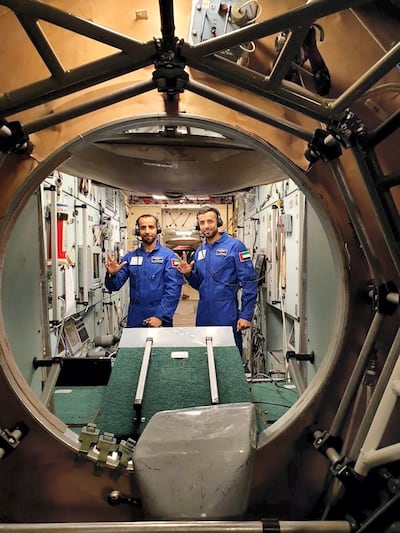In December 2017, Sheikh Mohammed bin Rashid, Vice President of the UAE and Ruler of Dubai, posted a tweet, inviting young Emiratis to register in the UAE Astronaut Programme at the Mohammed bin Rashid Space Centre.
The tweet awoke a sense of possibility in many Emiratis, Hazza Al Mansouri said during a talk on Sunday at the Emirates Airline Festival of Literature. For the first time, the Earth’s atmosphere could be a traversable line. Outer space was within reach.
“Many thought it impossible five years ago,” Al Mansouri said in the panel discussion, which also included Nasa astronaut and author Nicole Stott. “That tweet switched the minds of everyone in this country. Without hesitation, I applied. More than 4,000 applied.”
astronaut
A former F-16 pilot, Al Mansouri became the country’s first astronaut and the first Arab aboard the International Space Station on September 25, 2019. Al Mansouri spent eight days aboard the space station, which he said was like “a house with five bedrooms”.
“It is located 400 kilometres above Earth and going at a speed of 20,000km an hour,” he said. “I remember when I first floated in, I was so happy. The first time you enter the space station, you feel like a fish.”
Even after years of training and consulting others who had gone through the experience, Al Mansouri said nothing could prepare him for actually being aboard the ISS.
“It is an overwhelming moment,” he said. “You are there, floating. You are watching Earth changing between night and day. At first, you are looking at the United Arab Emirates. And after that, you just zoom out. You see the continents and oceans, and you realise there is only one border – the atmosphere.”

The astronaut said it was a privilege to be the first Arabic speaker aboard the ISS. To communicate from the station with people in the UAE and the wider region in Arabic was a profound experience.
Though he was the first Emirati to venture into space, he won’t be the last, he said.
“We now have four astronauts. We are really growing in the astronaut programme.
“Sultan [Al Neyadi] and I just finished our training at Nasa. In the future, we can go and participate in six-month missions, doing spacewalks. For children in my country, they can now say: 'We can be astronauts.' Something that was impossible before.”
Stott, a Nasa astronaut and and author of Back to Earth: What Life in Space Taught Me About Our Home Planet – and Our Mission to Protect It, also spoke at the event.
During her time with Nasa, she lived and worked in space for 104 days on the International Space Station and the Space Shuttle, and spent 18 days under water in the Aquarius undersea laboratory.
“There’s an overwhelming intensity to the beauty that you can see when you look at the window," she said, speaking of her first experience of going to space and witnessing the planet from above.
"It’s certainly a completely different look at Earth than we’ve seen before. I just remember being stunned by it. And every single time I looked out the window, I felt that way. Like there was something new to discover.”
She returned to Earth with the notion that humanity should be behaving like crew mates, not passengers, if the planet was to thrive. But we don't have to view Earth from above to feel that connection and sense of unity with the planet.
“I'd like to think that I didn't have to go to space to figure that out. But as a result of that I certainly want to share as much as I can with everyone about the experience.
"You can walk outside right here, in the nature that surrounds us, the sky that is above us and find your own way to appreciate the awe and wonder that surrounds us every day. There are otherworldly places on this planet that I think are there to surprise us, to make us more curious about where we live on this planet and how we live on this planet, and share it with the other life that is here with us.”























